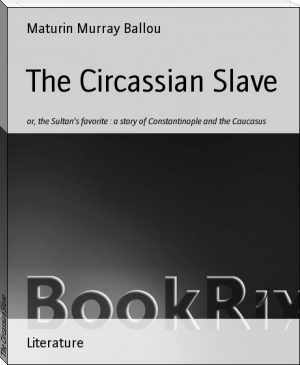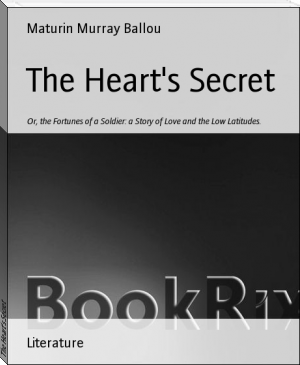The Circassian Slave by Maturin Murray Ballou (rosie project TXT) 📕

- Author: Maturin Murray Ballou
Book online «The Circassian Slave by Maturin Murray Ballou (rosie project TXT) 📕». Author Maturin Murray Ballou
Scarcely had he resolved the matter in his mind, as we have described, when Selim entered the cabin, and perceiving the refreshed and cheerful appearance of Aphiz, addressed him in a congratulatory tone.
"I rejoice to see you so well."
"Thanks to your prompt assistance and hospitality that I am not now at the bottom of the Bosphorus."
"You were pretty close upon drowning, and must have been under water for some time, I should say."
"I had indeed, and was very nearly exhausted," answered Aphiz.
"But how came you in such a pitiable plight, what led you so far from the shore without a boat?"
"I--that is to say--"
"O, I see, some matter that you wish to keep a secret. Very well; far be it from me to ask aught of thee, or urge thee to reveal any matter that might compromise thy feelings."
"Not so," answered Aphiz; "but were I to speak, I might criminate myself."
"O, fear no such matter with me, were you an escaped prisoner from the law, I--"
"What?" asked Aphiz, as he observed the young officer regarding him intently.
"Why, I should not betray you again into the Sultan's power. I have no real sympathy with these Turks, and would much rather serve you, who seem to be a stranger, than them."
"Thanks, a thousand thanks," answered Aphiz, warmly.
"Therefore, confide in me, and if I can serve thee, I will do so at once."
"I will," said Aphiz, who felt that the officer was honest in what he promised.
Then he told him how he had been condemned by the Sultan, for some private enmity, to die, but he carefully observed the utmost secrecy as to what the actual motive of his punishment really was. He told how he had been borne in the execution boat to the usual spot for the execution of the sentence that had been pronounced upon him. How he had been confined in the sack and cast into the sea, describing his first sensations and his struggle with his dagger until he cut himself free from the terrible confinement of his canvas prison. How he had struggled beneath the element, and then of the fearful eddy into which he had been drawn, and finally how at last he rose to the surface near his own boat.
That was all that Captain Selim knew of the matter, and after hearing that Aphiz was a Circassian, he supplied him with an undress uniform to further his disguise, and bade him welcome as his guest. Therefore when the Armenian doctor and Selim found that their conversation had been overheard by Aphiz, they neither feared his betraying him, nor suspected the deep interest that the young Circassian felt in the theme of their remarks.
"You were speaking of a slave of the Sultan's harem, named Komel," he said, approaching them.
"We were; and perhaps have spoken too plainly of a purpose for her release from bondage," said the Armenian.
"Why too freely?"
"Because in a degree we have placed ourselves in your power, having spoken treason."
"I care not whether it be treason or not," replied Aphiz; "it was such as answered to the feelings of my own heart in every word. Betray you! I will die to achieve the object you name."
"This is singular," said Selim, surprised at his earnestness.
"It would not seem so had I dared to tell you my story at first."
"Then you know the girl?" asked the physician and Selim, in a breath.
"Know her? I have been her playmate from childhood. We have loved and cherished each other until our very souls seemed blended into one."
"Then how came she separated from you, and now in the Sultan's harem?" asked the Armenian.
"Ay," continued Selim, "how was it that I saw her offered for sale in the public bazaar?"
"Have patience with me and I will tell you all, of both her history and my own."
Aphiz then related to them the story that is already familiar to the reader, and seeing that those with whom he had to deal were in no way particularly partial to the Sultan, he told word for word the whole truth, even from the hour when he had saved him from the Bedouins, to that when he had been cast into the sea.
All this but the more incited both Selim and the Armenian to strive for Komel's release, and sitting there together, the trio strove how best they could manage the affair. The Armenian's possessing the entree to the palace was a matter of intense importance to the furtherance of the object, and whatever plan should be adopted it was agreed that he should seek the harem and communicate it to Komel, thus obtaining her aid in its execution.
"Doubtless she thinks me dead," said Aphiz; "for the Sultan would take care to tell her that."
"That's true, and so let her think, and we will manage an agreeable surprise for her."
"As you will; but let us to this business this very night," said the impatient Aphiz.
"That we will, and right heartily," said Selim, who hastened to his young wife to tell her that she was to have a dear, beautiful companion in their proposed voyage, and that she would be on board before the morning.
Aphiz was now all impatience. He could scarcely wait for the hours to pass that should bring about the period allotted for the attempt to release her whom he so fondly, and until now so hopelessly, loved. In the meantime the good Armenian physician, with redoubled interest, now that he had learned Aphiz's story, sought the Sultan's harem, where he quietly broached to Komel the plan that had been agreed upon whereby she should be transported once more to her distant home and the scenes of her childhood.
CHAPTER XIII.
THE ESCAPE FROM THE HAREM.
On one of those soft and glorious nights such as occur so often beneath the eastern skies, when there was no moon and yet a blaze of light pouring down from the myriad of bright stars, that one would not have missed the absence of the Queen of Night; the walks of the Sultan's gardens, fragrant with flowers and sweet blossoms, were drinking in of the dewy hour, still and silently, save at the point where we once before introduced the person of Komel. The spot from whence she had listened to that tender and dearly loved song of her native valley, and nearly in the same place she sat now, again evidently listening and expecting the coming of some person or preconcerted signal.
On the extended branch of the nearest cypress hung the half-witted boy by one arm, which he had cast over the limb, and from whence he was now oscillating like a pendulum, his head hanging down upon his breast, and the rest of his limbs as moveless seemingly, as though he had hung there for months. It was one of the queer odd freaks that he was so often performing, for what purpose no one knew, and there he hung still, while the slave listened and cast anxious glances at the stone wall that forms the sea side of the seraglio gardens.
But no sound greeted her ears save the never ceasing babbling of the fountains, and now and then the soft plaintive cry of some night bird that, wakeful while most of the species slept, warbled its notes to the stars. Once she thought she heard the muffled sound of oars, and started to her feet, but the noise soon died away in the distance, and she relapsed again into the same attitude of impatient and anxious anticipation. Out from under the apparently drooping and senseless eyelids of the idiot, a quick thoughtful glance was turned upon her at every motion she made, but she knew it not, nor did she turn towards the boy at all, while he still swung steadily as though he had been bound by cords to the tree.
Once more she started, but it was a false alarm. The notes she had heard were those of an instrument, played by some favorite of the harem, who looked forth upon the night scene, and coupled its charms with the notes of her lute.--But this too soon died away, and again Komel breathed quick and anxiously as she sat there at midnight. The guard on his rounds came past now, and she assumed a quiet and careless air to avoid notice, while a soldier cast a wondering eye at the idiot boy, and then strode on, with the barrel of his carbine resting lazily in the hollow of his arm.
At this moment there swelled forth upon the night air the note of that well remembered song. It was the preconcerted signal, and springing to her feet, Komel stole quickly to that part of the seraglio wall nearest the water. The idiot boy seemed to comprehend the movement instantly, and to recognize the notes that he had heard once before, and which had so affected the beautiful Circassian, nor had she fairly reached the wall before he was close by her side. She paused for a moment to smile kindly upon him and place her hand upon his head, then turned to listen again.
The boy appeared to understand that something extraordinary was going on, and became as nervous as possible. Now he darted off towards the path where the sentinel had disappeared, and now came back with a step as fleet as a deer, and as noiseless as a cat's. But the scene soon changed by the appearance, above the wall, of the head of Captain Selim, who, peering carefully around for a moment, asked in a whispered tone:
"Lady, lady, are you there?"
"I am," replied Komel, cautiously, while the idiot crowded close to her side.
"If I throw over this rope ladder, will you mount now to the top of the wall?"
"Yes, O yes; let me get away from here quickly."
"Step away from the wall then for a moment," said the young officer, and in an instant after a rope ladder made fast on the outer side, was cast over to her.
"Are you ready, lady?"
"Yes."
"Then come quickly; don't pause for a moment in the ascent, lest you be seen."
Komel thinking of nothing but release from her confinement in the Sultan's household, and seeing in perspective her home and parents, for the Armenian had promised that she should be taken thither, sprang lightly up the tiny, but strong ladder of cord, and was soon on the other side, the boy creeping after as she went. But just as she had passed over the top and was descending on the other side, leaving the idiot boy on the top beside of the young officer, who stood so that his neck and head were above the level of the summit of the wall, the sentinel again came down the path in sight of the place and instantly discovered the whole affair, running with all speed to the spot. The soldier dropped his carbine to seize and detain the ladder, when a struggle ensued between him and the young officer for its possession.
At this critical moment, the soldier seeming to recollect himself, turned to raise his gun, either to shoot Selim or give the alarm; in either case it would be equally fatal to the success of their design. The boy had maintained his position during the brief struggle,





Comments (0)